These days, people perceive the first product to get to market as the standard. So, when you don’t take your product to market quickly, you increase the chances of your competition dominating the market even if you have a better product. And this puts you in the place of an alternative instead of the innovator.
A lot of startups wish they had the skill set to take the world by storm, but are bothered by their limitation in writing codes. What if you don’t need to understand any coding language to build that “next big thing.”
That’s where Bubble.io comes in.
The platform allows you to build mobile and web apps without understanding a thing in programming. With its intuitive drag-and-drop builder, you can easily add maps, text, icons, videos, buttons, and more.
Albeit, Bubble.io also allows developer-level customization, making it interesting for people who enjoy programming.
Key Takeaways
- The opportunity to test different ideas through internships or interviews helped to start the company, but there was also a bit of serendipity and luck.
- Writing code is probably the biggest hurdle for most people trying to get into technology
- Bubble.io is not only cheaper than hiring an engineering team, but also much faster to build products.
- Many people have ideas of things to do with software but lack the skill set to build it.
- Bubbleio will let them go to market probably ten times faster than building an app traditionally.
- The number of hours of first response for Bubble.io’s support and forum are regularly under two hours and 10 minutes respectively.
- Be wary of tools that promise to help you do a lot of things without a learning curve. You’re likely to make mistakes along the way, so you need to know how to avoid or correct your mistakes while using the tools.
- Bubble.io is built for the web and web applications, but not for applications that go to the app stores.
- If you don’t have the patience to learn the tool, you won’t have a good experience with Bubble.io.
- Migration is possible with platforms that are integrated
In this interesting interview with Emmanuel Straschnov, Bubble.io’s founder, you’ll know what it takes to build powerful apps without coding
My Discussion with Emmanuel Straschnov

- Image Credit: Bubble.io
1. Hello, please introduce yourself. Give us a brief history of Bubble.io and tell us what inspired your no-code approach.
I’m Emmanuel Straschnov and I founded bubble.io in 2012. Bubble.io is the most powerful no-code platform currently in the market. And by that, I mean we can build pretty much anything today for the web, without writing code once you know how to use the tool.
Writing code is probably the biggest hurdle for most people trying to get into technology. Many people have ideas of things to do with software but lack the skill set to build it
We started the company back in 2012 because we saw a huge need for an easier way to build things online. Back then, too many people in New York and now everywhere had ideas of things to do with software but just didn’t have the skillset to build it. And we felt it was a shame.
Writing code remains probably the biggest hurdle for most people trying to get into technology. So our solution to this was to make technology more accessible by making it possible for them to create without writing codes.
2. You graduated from Harvard, so it might be absurd to ask if you still invest in yourself and your career. But seeing that Bubble.io isn’t based on what you studied, we’re curious. How did you get into this? What courses, training, or coaching helps you stay afloat? How did you move from what you studied to building Bubble.io.
It was not planned. I didn’t go to business school thinking I’ll be doing this.
Regarding your question of which courses have helped me start the company, I can think maybe two. But it’s two out of 20 since most of the classes I took were not relevant.
Although, I think one of the best things I made out of my business qualification was to try to think about what I really wanted to do. And also, to find something that I’m excited about. If you think about business school through that lens, it definitely guided me to do something like Bubble.io.
The opportunity to test different ideas through internships or interviews helped to start the company, but there was also a bit of serendipity and luck.
I was a consultant, so I thought of my business school life as an investment. During my second year, I almost worked for an NGO and I ended up starting a software company. So the opportunity to test all these different ideas, whether it’s through internships or interviews, was what slowly guided me to starting the company.
Albeit, at some point it’s also a little bit of serendipity and luck.
I was introduced to Josh who is now my co-founder. Since I already had a job lined up at the startup that I was about to take, it wasn’t random because we had a mutual friend introducing us. But had I met him a week later, I would not have said yes to work with him.
When we met for coffee in New York, that same day we said, okay, let’s do it together. So at some point business school wouldn’t have helped me with that. It just created the conditions for me to have that encounter and then saying yes.
3. Whose messages always get you excited to open their email? In other words, who do you listen to?
If you’re getting that personal, I have to say my wife, you know. It’s an easy answer, but who would say differently?

4. Some people believe that Bubble.io has a steep learning curve. This is based on reviews and general opinion. Do you provide resources to help beginners understand the fundamentals of using the platform?
We do. I mean, we always try to provide them with more things. So we have click-by-click lessons, videos, user manual, and the forum.
The main value of the forum is for people to help each other. We’re now setting bootcamps and starting a coaching marketplace so that people can find coaches by the hour to get some help.
Be wary of tools that promise to help you do a lot of things without a learning curve. You’re likely to make mistakes along the way, so you need to know how to avoid or correct your mistakes while using the tools
One thing I’ll say though, to anyone who’s interested in this space, don’t trust tools that tell you, you can do anything, but don’t have a learning curve. Because it’s just not true. If a tool allows you to do a ton of things, that means you’re going to have a lot of freedom.
However, having a lot of freedom means having the freedom to make mistakes. And so if you make mistakes, you’re going to have to learn how to use the tool to avoid those mistakes. And to do that you need to learn.
There’s a learning curve. And it’s okay. A steep learning curve, as long as it’s not 50 hours, but more like seven to 10 hours it’s something a lot of people can do, so it’s worth it.
5. Why does Bubble.io use forums instead of support to solve users’ problems? Has this approach proven to be more effective? And how involved is your team in the forum?
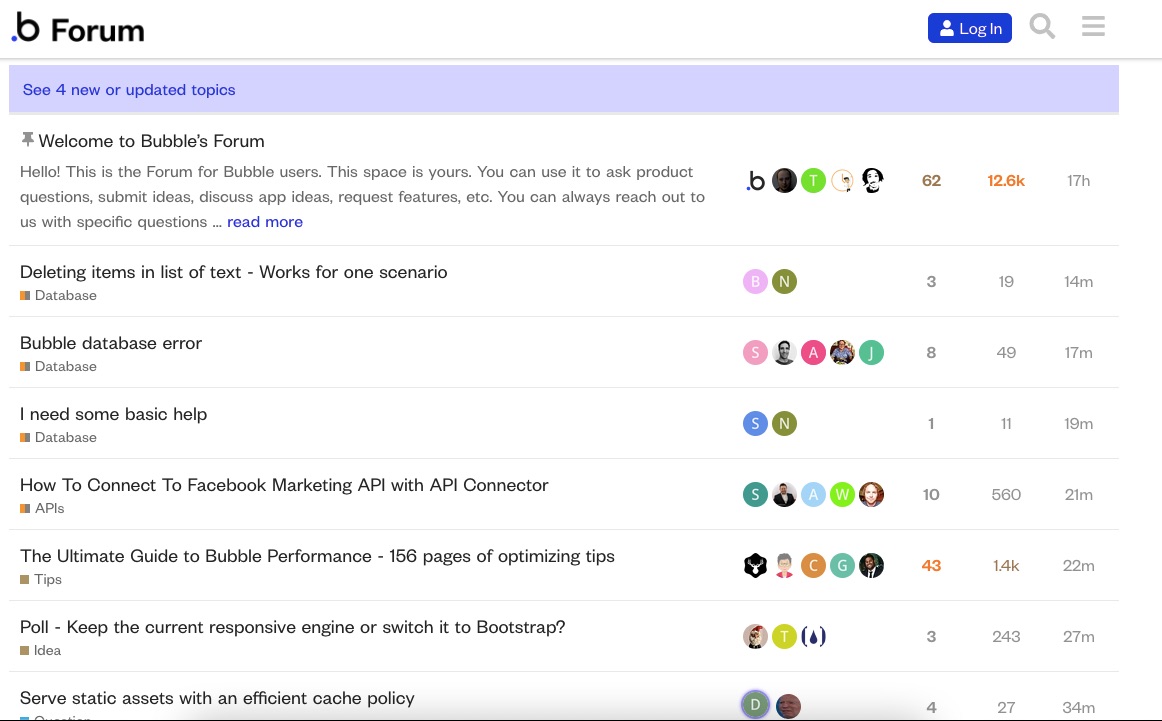
We use both. In fact, we have a support team of eight people and they usually respond very quickly. One of the numbers we track is the number of hours for first response, which is regularly under two hours.
That said, you’re going to have an even faster response in the forum just because of the number of people we have there. Also, our support team helps people when they hit a dead-end or when they need explanations. We don’t, necessarily, have the bandwidth to go deep into each application.
You’re going to get more individualized help on the forum because a ton of people are active there. Even though that sounds strange.
Another metric we also track, that I’m very proud of, is the time of first response on the forum. This measures how many minutes it takes you to get a response once you open a new thread. And we’re consistently below 10 minutes.
No support team in the world can do that.
Does that mean you have a support team in the forum?
Our support team monitors the forum. But no, when I say the forum, it just means other users.
6. A user said that the responsive settings of Bubble.io are less than optimal, preventing him from building for some people. Are there specific niches that might have a problem building a web app with the platform?
It depends which group of people you’re talking about and what they’re trying to build. If you’re trying to build a platform game or an iPhone app on the Android app. Well no, Bubble.io is not a great tool for that because it’s not what we built for.
We built for the web and web applications. Works great on mobile, but not for applications that go to the app stores.
Bubble.io is built for the web and web applications, but not for applications that go to the app stores
If you’re talking about groups in terms of demographics. Yeah. To be very blunt, if people don’t have the patience to learn the tool, they’re not going to have a good experience with it.
We try to ease that learning curve as much as possible, but it will always be there. But again, if you don’t have a learning curve, you’re not going to be able to do anything.
7. Can users migrate their app from or to your platform if they choose to do so?
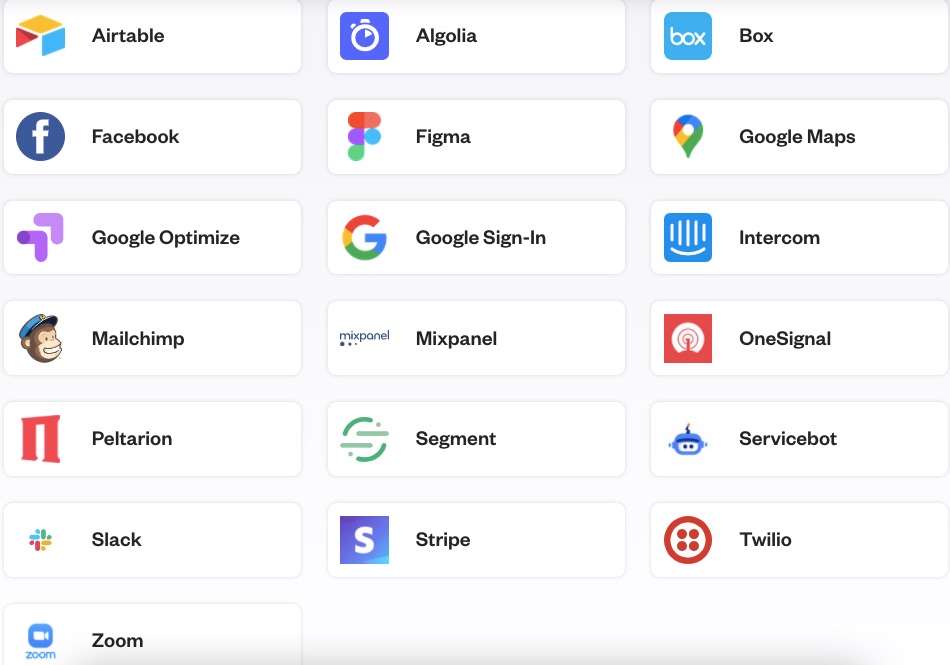
It depends. We have a built-in integration with Figma. So if you have a design in Figma, you can transition that to bubble.io and build your app from that design.
Migration is possible with platforms that are integrated
If you’re trying to move from another local platform like Squarespace or Wix, and try to get that into Bubble.io, currently you can’t do that.
8. You raised your first round of funding from SignalFire and Neo in 2019. How has that funding helped your users and supported Bubble.io’s growth?
Well, we were really understaffed before the round. Just the number of users and the complexity of the product was too high compared to the number of people we had. So, the fundraising was very helpful because you just let us hire people much faster.
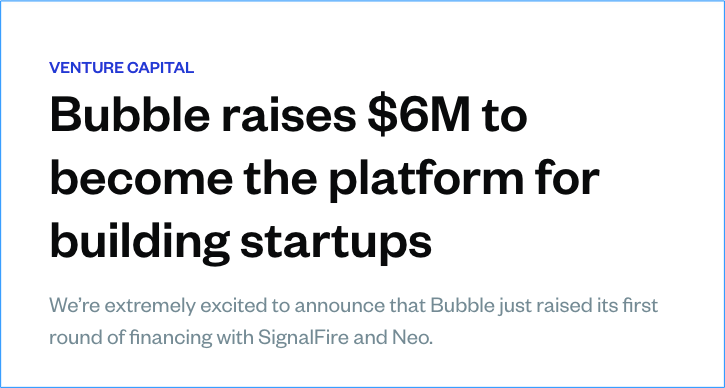
Before the round, we would hire one person per quarter. And we were very careful with our finances. Today we’re still careful with our finances, but we’re allowed to invest much more because we have cash on the balance sheet to do that. So, that was the main change
It also helps us with acquisition. And that was very timely.
When we started the company back in 2012, no-code was not a thing. There was not a lot of attention for the space.
But this year, things have changed dramatically. And as they changed, it was very important to be able to be visible and to invest in our growth and marketing.
9. Although Bubble.io is a codeless builder, does it allow developer-level customizations?
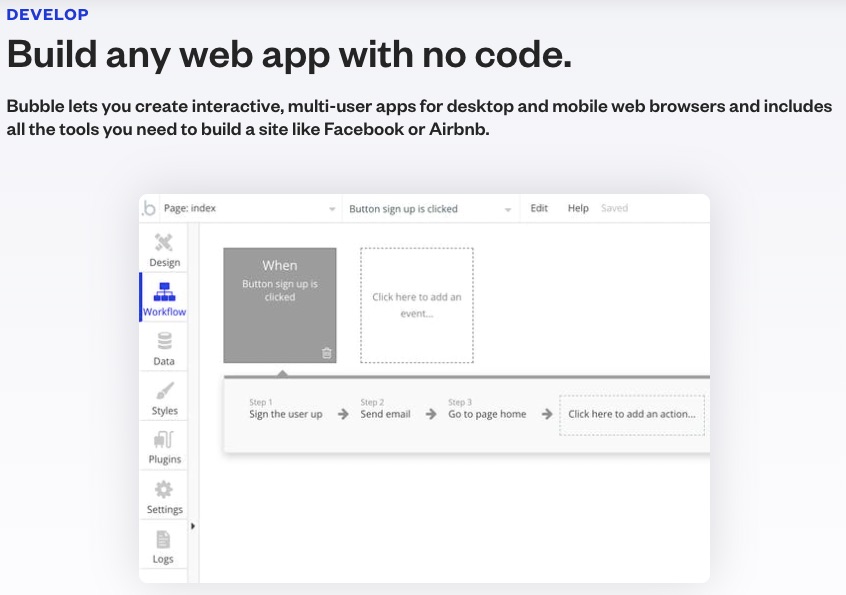
Yes. That’s what makes us different from all the other tools. If you know where to click in our interface, you can have extremely customized behavior. Hence the learning curve.
10. According to Statista, over 50% of web page traffic came from mobile devices. How does Bubble.io ensure that its web apps are mobile-responsive?
We support responsive designs. To be very honest, that’s not where our product is the best today because we built that in 2015. It’s been five years now and I think we have to do another of that technology. But the result is the same though.
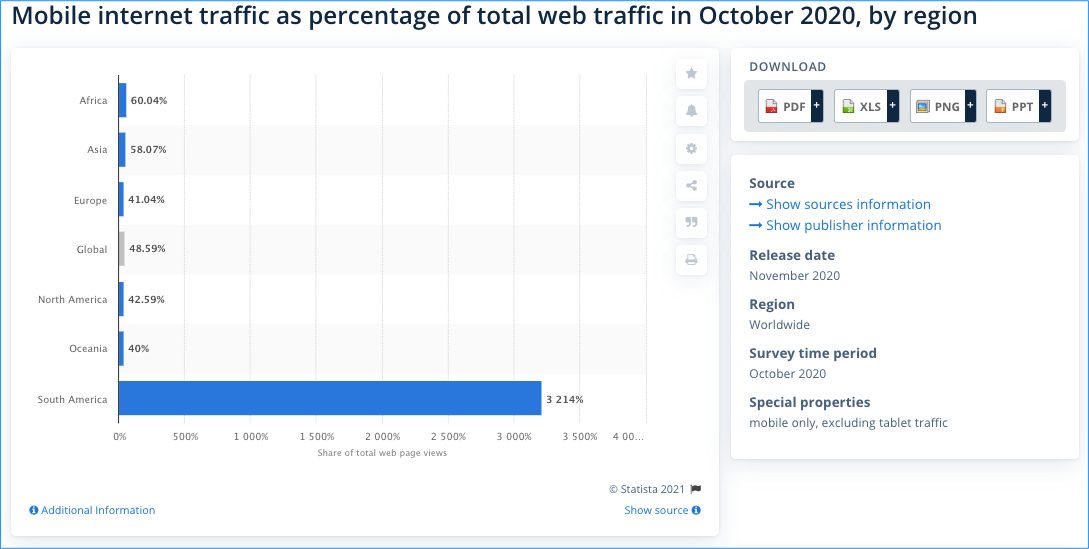
If you go to our own website, Bubble.io, which is built on Bubble.io on a phone, it works fine. So, yes, you’re right. Half of the traffic in the world is coming from mobile devices. And so you have to be responsive, which we are.
But that doesn’t mean we can’t improve things. And I’m hoping at some point we’ll get into generating native applications, but it’s probably for another 18 months from now.
11. How easy is it for users to size their application for different devices.” Are there some technicalities involved in this process that users should know about?
Technicalities, I wouldn’t say that. But there’s a learning curve. You need to learn the different responsive settings we offer. As for resources that they can learn from, there’s currently a video where you’d actually recognize my voice.
12. Some people are skeptical to build their apps on new platforms. Of course Bubble.io being around since 2012 isn’t new. But for someone hearing about Bubble.io for the first time, how can you convince them that it’s worth it?
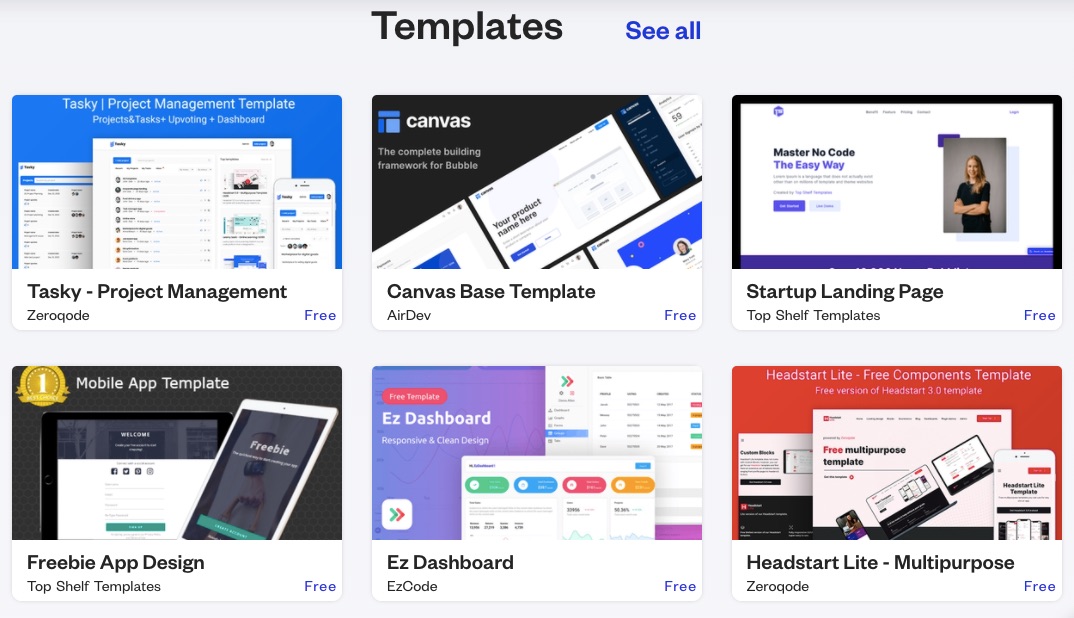
Bubble.io will let them go to market probably 10 times faster than if they were trying to build that traditionally. So it’s not just about money. The time using Bubble.io is not only cheaper than hiring an engineering team, but also much faster to build products.
And so you’d be able to test your idea much sooner. Although I don’t think it will happen, because over the years we see people staying with us for a long time. But if at some point you’re not satisfied with a bubble.io, you can always start from scratch.
Bubble.io is not only cheaper than hiring an engineering team, but also much faster to build products
However, you’d have built product validation and gathered user feedback because you will launch early. The main mistakes I see people make when they build products is that they take too long to build and they invest too much money before even gathering feedback. No code, in general, and Bubble.io in particular is a way to solve that.
13. What other mistakes do people make when building an app?
Well, it’s going to come down to the learning curve. I think it’s really important for people to learn the tool before throwing themselves into building something.
What I’ve seen is people trying to build immediately without spending the few hours it takes to understand how it works and they end up having a bad experience.
14. What’s the future of Bubble.io?
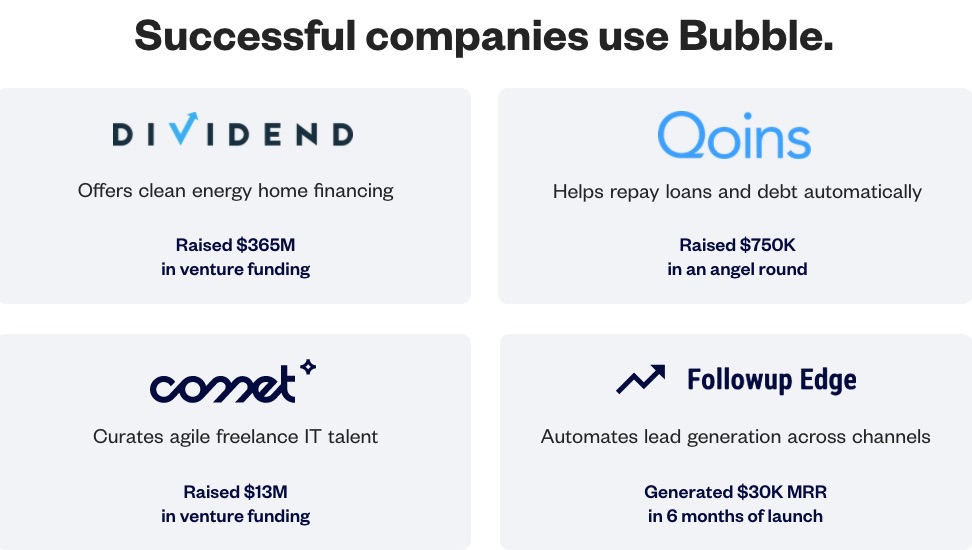
We’re rewriting, entirely, how “responsive” works in our world. To make it more modern and at par with modern technologies that exist in the browser. We’re going through a full redesign of our editor.
We’re going to start scaling our bootcamps pretty aggressively so that people can have ways to build things. They can learn Bubble.io as groups more efficiently and faster.
We’re in the business of pairing startups on top of us. So, in general, the main focus of the engineering team is just to make sure that as businesses grow on top of us they can scale. We’ll make sure that the platform gets better over time for them. So the bigger they get, the faster the product gets, which is a full-time job for an entire engineering team.
From a corporate standpoint this year will be about building a strong leadership team. So, we’re bringing senior people to help us take the company to the next level.
We’ll make sure that Bubble.io is part of any conversation around building a product or starting a tech startup. That’s because it’s one of the best ways to build a software for a new company and people should know about it more.
15. What’s unique about Bubble.io you haven’t told anyone or don’t talk about so often?

You know, I’ve been talking about Bubble.io for eight years, so I can’t really guarantee how much I haven’t said. But, if there’s something that I haven’t told anyone currently, it’s probably something you shouldn’t talk about. I’m not exactly sure there is a clear answer here, but let me think.
It’s going to sound cheesy, and might not sound like, wow! This is cool. But something we don’t emphasize enough when we communicate is how important our users have been in the early years. And the fact that had they not been with us, we would not be here today.
And it’s not about money because for the first four or five years, honestly, the company was not making a ton of money. Not even enough money for Josh and I to get a good salary, but the fact that we had them and that they were trusting us to build small startups.
But something we don’t emphasize enough when we communicate is how important our users have been in the early years
Most of them hadn’t raised a dime. They were pretty small companies, but the fact that they were trusting us to build a thing, even though we were completely unproven technology.
Well, today it’s easier and less risky to come to Bubble.io and build something. But, that was really what kept us going.
And it was not easy every day. Like for five years, the product was looking better and better. It seemed like we were very product-focused, but lacked the excitement of starting a fast-moving company.
That’s sometimes tough on your morale. I mean for me and my co-founder, Josh. And having these users was why we kept going.
There were times where we were like
- Should we just move on?
- This is not going to go anywhere, or
- We’re losing our time here
But the fact that we had these users waiting for us and expecting us to keep supporting them was why we kept going. Looking back, I’m so glad that happened because now we’re in a much better shape. But it was not an obvious choice back in 2016.
